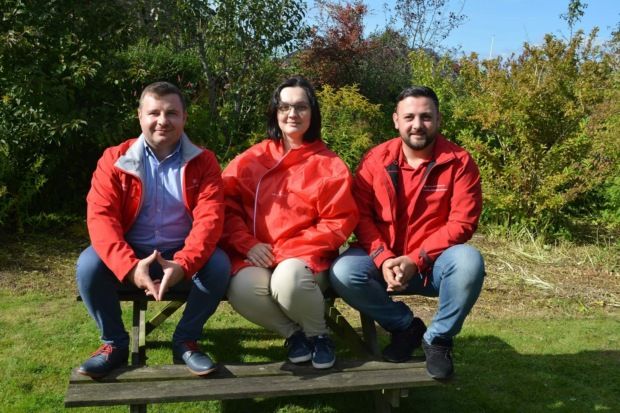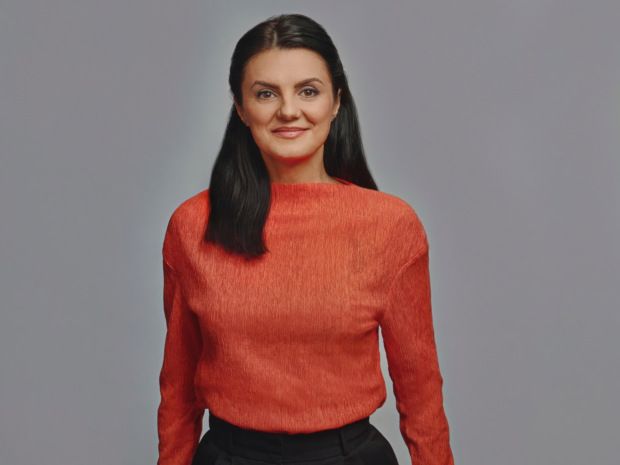The map above shows the geographical spread of Romanian candidates running for election in 2021.
The majority of the 17 are representing municipalities in Jutland, with just one in Fyn, and three in Zealand.
But despite the distance between them, there are notable parallels between their policies – the result of a shared understanding of the unique integration challenges faced by internationals.
Communication is key
Cross-cultural communication is a major policy influence in many cases. Esbjerg’s Daniel Avram asserts “we have to learn from each other” – a philosophy he put into practice when he established a Danish-Romanian association in 2019.
Ovidiu Nechitoi in Åbenrå envisages a broader association that extends to all expats. Nechitoi worked on a dairy before moving into consulting in Kolding, and he understands the value of services like international-friendly unions and recruitment centres.
His proposition for a city hub geared towards helping expats would go a long way to “making us seen”, he contends.
Equal opportunity
For Alina Racila, who is campaigning for votes in Tønder, West Jutland, equal opportunity is a key concern. “Your gender, age, nationality, education or disability should not stand in the way of a good life,” she says.
Much like Avram, Roxana Simion, who is standing for election in Frederiksberg, wants to “open up a conversation between Danes and foreigners”.
“We have a lot to learn from each other,” she says. “I want to create a warm, welcoming phase for everyone who is new to the country.”
Simion also emphasises the importance of accessible language-learning – something Racila knows only too well from her time fitting language classes around her full-time job when she first moved to Copenhagen in 2014.
Romanian winner
Education and accessibility was also a key policy on the table for Narcis George Matache, a Romanian national who ran for Socialdemokratiet in the North Jutland Region elections in 2017.
During his campaign, he established meetings and social events in English to explain the breakdown of local voting systems. The goal was to involve internationals in the election process – no matter what standard their Danish skills were at.
In the end, he failed to win a seat by just 300 votes, but in March 2019, following a retirement, Matache was promoted to the position of first deputy, which is a recognised political position.
He is accordingly standing for election to the North Jutland Region council with an extra spring in his step.
Romanians seeking recognition
The eastern European country has an unprecedented number of candidates seeking election
An impressive 15 Romanians are seeking election to their respective municipal councils on November 16, along with a further two in the regions.
Of the 15 candidates, 11 are running in Jutland, and the overwhelming majority are not running in municipalities in major cities – Roxana Simion (see page 23), for example, is the only candidate in Greater Copenhagen.
CPH POST accordingly though it might be interesting to catch up with three of the Romanian candidates in the most remote of the country’s five regions, the Region of Southern Denmark.
In for the long haul
Alina Racila, Ovidiu Nechitoi and Daniel Avram are respectively seeking election in Tønder, Aabenraa and Esbjerg.
And we discovered during our interview that they have several things in common – besides their surnames are being equally hard to pronounce.
As Socialdemokratiet candidates, they more or less share the same political agenda. They all call Denmark their newfound home. And they all want to score big in the municipal elections on November 16.

Leading by example
In 2011, with a master’s degree in international affairs, Ovidiu assembled his belongings and took a 35-hour bus ride from Romania to Padborg.
“I still recall arriving in Denmark – it was the usual February-like weather.” We all know what that means: cold and gloomy.
Ovidiu spent his first few months in his new country working on a dairy. It was an old lady, who the now 36-year-old still holds close to his heart, who encouraged him to look for a better job suited to his qualifications.
He eventually found work as a consultant in Kolding, which is only a 40-minute drive from his home municipality, Rødekro.
Language key in the sticks
Racila too worked for a dairy, in fact just a stone’s throw away from Rødekro, but in the municipality of Tønder directly above the border with Germany.
Together with her husband, they moved to Denmark in 2014 as newlyweds. And soon, as is often the case, the ‘honeymoon’ was interrupted by some rude awakenings:
“Everybody always told me how easy it is to integrate speaking English only.”
But soon Alina and her husband discovered that this is not always the case – which of course caused many difficulties along the way.
After their daily diary duties, Alina insisted they both attend language school: “Imagine working eight to twelve hours of hard, physical work and then getting your dinner in between work and language lessons.”
Avram knows only too well how difficult it can be to negotiate southern Denmark using only English. As a councillor in Esbjerg, he wants to make integration in the area a tad easier.
When the now 32-year-old came to Denmark for his studies in 2009, he frequently found himself in difficult situations: “I still remember how it was, arriving without speaking Danish. Hardly anybody spoke English outside the university.”
More visibility
All three are committed to using their experience to effect change for future expats arriving in Denmark.
Avram is convinced that there must be an ongoing communication between Danes and non-Danes. “We have to learn from each other,” he contends. In 2019, he established a Danish-Romanian association in 2019 to encourage such communication.
Should he win a seat in the upcoming elections, he wants to take it to the next level in his municipality, as “we want to be recognised”, he contends.
”I want to make us seen,” concurs Ovidiu. More specifically, he’s aiming at improving the access for expats to jobs that suit their skills. “I’ve seen people with PhDs milking cows and that’s not fair,” he recalls.
Ovidiu wants to establish a union-like international house where expats can access a job-matching service.
Along with an information counter providing useful knowledge about how to enrol your kids or where to learn Danish, Ovidiu wants to improve the conditions for Rødekro greenhorns across the board.
Family focus
Alina’s agenda, which is slightly broader, reflects how young families are increasingly choosing to live in Tønder.
“We must look at how we can make our municipality more family-friendly,” she contends.
The priorities of the municipality need to be rethought accordingly, with more funds allocated to making Tønder a nice place to live for younger generations.
Can Roxana become Frederiksberg’s first foreign councillor?
Romanian nursery worker would like to effect changes for internationals: most notably in the way they are welcomed to Denmark and taught Danish
Ahead of the Frederiksberg Municipality elections on November 16, Roxana Simion is quite busy.
Following work at a local nursery school, the Romanian Socialdemokratiet candidate rushes on to the next item on her agenda: a meeting with fellow party members to discuss pre-election matters.
Nevertheless, she found some time between her errands to sit down and talk to the Copenhagen Post about her election prospects.

Frederiksberg resident by choice
The 36-year-old was born and raised near Iași, Romania. At the local university, she started to study social work in 2003 and subsequently moved to Denmark in 2007.
Before she started her master’s degree in education in 2016, she worked both professionally and voluntarily, helping where help was needed.
Over the years, she has learned what it feels like to be a foreigner in Denmark with no political representatives and she wants to address this void should she win a seat on the city council.
Was there a specific moment when you realised you wanted to run for office?
I think of it more as a process. As a foreigner in Copenhagen, the small frustrations add up over time. Not being represented in local politics makes us feel less appreciated. It’s like we’re doomed to always finish in second place. It’s not necessarily anybody’s fault – but Danes can’t relate to this problem because it’s simply not theirs.
In the end, I believe it was my own desire to have a spokesperson that represents not only international residents in Frederiksberg but who tackles the important topics. And since nobody else was stepping up, I decided to do it myself.
What do you want to change the most?
As somebody working at a nursery, I am confronted every day by how big an impact these early years have on the children of Denmark, and I am convinced that there is some room for improvement.
I really want to change the group sizes and the ratio of children per pedagogue. Right now, I and two colleagues have 13 children under our care. That’s quite busy, considering we don’t only have to look after them but also actively teach them how to tie their shoes, how to eat and so on. The list is a long one, and more often I feel like I didn’t have enough time to properly commit to the children on an individual basis.
Another point I would like to change is how Danish is taught in language schools to foreigners. I am convinced a practical approach would significantly enhances the process. Simply looking at textbooks isn’t motivating. I, myself, learnt the language tackling daily tasks. I immediately found myself confronted with the ultimatum of either learning the language or talking English. Sure, I was struggling sometimes, but in retrospect this was the most effective way of getting to know the language.
Should you be elected, you’ll become the first ever foreign council member in Frederiksberg. What will you bring to the table that Danes can’t?
I especially want to create a warm, welcoming phase for everyone who is new to the country. The first thing people encounter as soon as they come to Denmark is the bureaucracy. That’s not an exclusively Danish problem: Danes are in fact quite welcoming and open towards us foreigners. It’s just that moving to a different country is overwhelming itself and personal contact certainly helps. And a whole heap of missives just adds to the confusion and frustration. I believe more meet-ups and one-on-one talks will create a more sustainable feeling of being welcome from the get-go.
And I also want to open up a conversation between Danes and foreigners. Because, after all, I think we have a lot to learn from each other.













